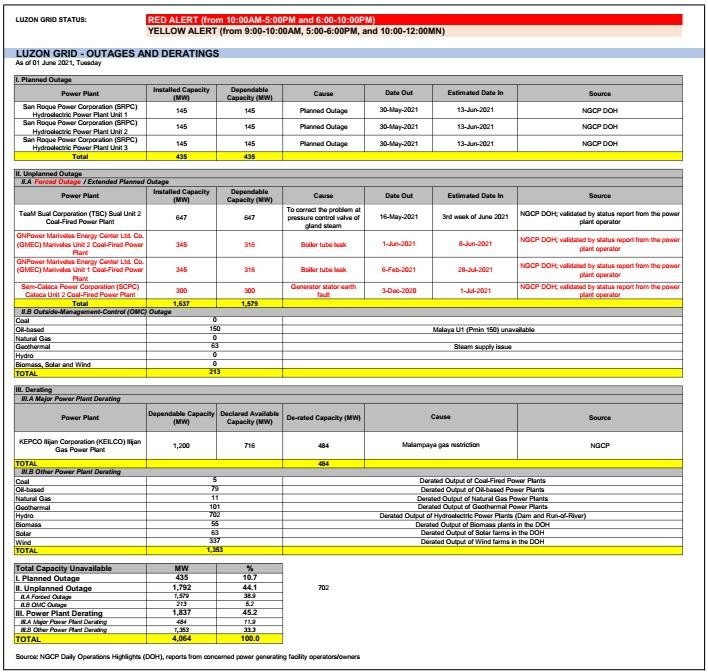
TAGUIG CITY - The Department of Energy (DOE) convened with representatives of the National Grid Corporation of the Philippines (NGCP) and GNPower Mariveles Energy Center (GMEC) at 8:30 AM today to discuss the unplanned outage of GMEC Coal-Fired Power Plant Unit 2, which took place earlier at 3:56 AM.
This resulted to the Luzon Grid being on "RED ALERT" from 10AM to 5PM and 6PM to 10PM, and "YELLOW ALERT" from 9AM to 10AM, 5PM to 6PM, and 11PM to 12AM.
SUPPLY AND DEMAND FIGURES
The DOE presented the supply and demand situation, with the total projected available capacity today at 11,408 MW, relative to the projected system peak demand at 11,593 MW.
*Kindly refer to the accompanying table for the breakdown of powerplants in the Luzon Grid on Outage as of today (1 June 2021).*
• Total Planned outage = 435 MW
• Total Unplanned / Forced Outage = 1,579 MW
• Total Major Derating = 484 MW (Ilijan’s reduced output to 716 MW due to ongoing Malampaya gas restriction from 835 MW in the previous week)
In addition to the plants on outage yesterday, GMEC Coal-Fired Power Plant Unit 2 (316 MW) has been declared unavailable due to a suspected boiler tube leak. The plant is expected to be back online by 8 June 2021.
MANUAL LOAD DROP OR POWER INTERRUPTION
In order to maintain a balanced system, NGCP may implement Manual Load Dropping (MLD) in parts of Luzon today to maintain the integrity of the power system.
WAY FORWARD
The DOE continues to monitor the power situation and will submit the additional pieces of information for the consumers and the enforcement agencies, including the Energy Regulatory Commission (ERC), the Philippine Competition Commission and the Department of Justice, considering its long term strategy of addressing the power supply and demand situation during the summer season. It continues to remind the distribution utilities and the system operator of its contracting obligations to address the needed capacity increases for a reliable power system for its consumers.
While the Department is working towards resolving these persistent issues, it is not something that could be accomplished overnight.
Among the steps that the DOE have taken include:
• The Competitive Selection Process policy so that Distribution Utilities may already bid out their requirements for new investments to come in.
• The introduction of amendments to the market to allow more transparency in sending out investment signals.
• The moratorium on new coal-fired power plants to emphasize the need for system flexibility.
• Ancillary Services policies so that NGCP will contract on a firm basis all AS requirements given that they need to do forward contracting of these requirements and should not rely solely on what is available in the system.
• The introduction of the Reserves Market to co-optimize the utilization of energy and reserves. This is an additional avenue for investments.
Lastly, being a performance issue, the DOE likewise calls on the ERC to look into these outages and exercise its regulatory functions as the energy family continues to work together to ensure the continuity of power services during these challenging times.
###
